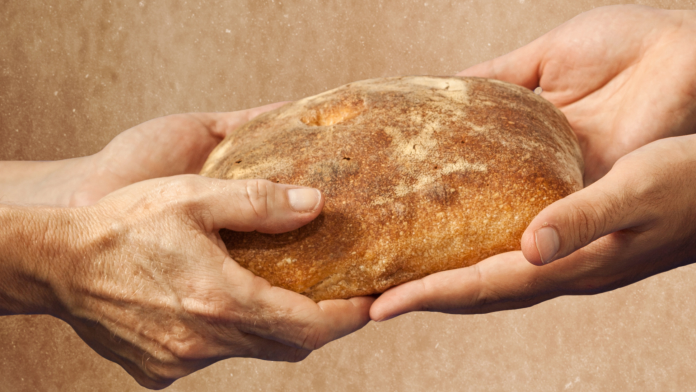Written by: Bill Riedel
Bill Riedel is the founding and lead pastor of Redemption Hill Church in Washington, D.C. He was formally trained at Trinity International University (BA) and Trinity Evangelical Divinity School (MDiv) and has served in ministry since 1998. He is also on the board of the EFCA. You can follow him on Twitter.
This following content was originally published on Acts 29’s website, linked HERE.
I just had two of my wisdom teeth extracted. At 42 years old, and after about 25 years of nagging from dentists, it was finally time. The few days that followed meant I was stuck eating varied types of soup. Forget the pain and discomfort; the inability to eat a full meal was by far the toughest part of the experience. It’s difficult to ever feel nourished by soup alone, with no bread or substance.
I live in a place of abundance. I can walk to world-class restaurants and coffee shops any time. I can choose what kind of groceries to buy—from a fresh, organic market to a chain grocery store. In other words, I don’t often go lacking. Many of us don’t.
The same kind of abundance surrounds us in spiritual resources as well. There are more books, conferences, podcasts, and studies than time to engage them. We have massive theological libraries that are digitally packaged and searchable within milliseconds. There has never been a time in history when so much information about God existed. Yet it’s easy to fill up on good spiritual material while feeling spiritually malnourished.
As J.I. Packer put it, “A little knowledge of God is worth more than a great deal of knowledge about him.”
A Feast for All
As pastors and church leaders, and especially in the early days of a church plant, there’s more to do than we can ever accomplish. For the preacher, as soon as we finish preaching on Sunday, the next Sunday is already looming. The preached Word of God is essential in church life and ministry, and that brings a weekly pressure to have something to say. Amid the glorious weekly grind of ministry, it’s too easy to bypass our own hearts as we bring holy words to God’s people. We may do very well feeding Christ’s sheep while neglecting our souls.
When Jesus said, “I am the bread of life; whoever comes to me shall not hunger, and whoever believes in me shall never thirst” (John 6:35), he meant for all people. That includes you, pastor; and you, student ministry leader; and you who lead faithfully each week in a community group. We must be careful not to try to make it on the thin broth of proximity to spiritual things, even while inviting others to feast on Christ as the bread of life. We can’t approach spirituality like keto, bread-free, and expect to be nourished and sustained.If you’re continually feeding on Scripture, you can give to others from an overflow of what God’s Spirit is doing through the Word in your life.CLICK TO TWEET
The good news is that there is no mystery in how to come to Christ as the bread of life. It just means that we who lead, teach, and preach need to do the same things we call others to do for their good and God’s glory.
A Feast on the Word and Sacraments
First, keep pressing into Scripture. Jesus, the eternal and living Word, has offered himself as the bread of life. With the Spirit’s help, turn to Scripture first for your own heart, edification, and nourishment. If you’re continually feeding on Scripture, you can give to others from an overflow of what God’s Spirit is doing through the Word in your life. Let’s commit that we will sit and soak in the text, taking as long as we need to ensure our hearts have been affected before ever stepping into the pulpit to preach it.
Then, don’t neglect the sacraments. Jesus ordained baptism and the Lord’s supper as the means to confirm and nourish our faith. We know they are not salvific in and of themselves, but we also must remember that these ordinances of the church, when celebrated in genuine faith, are more than mere symbols. They are means by which God’s Spirit works in our hearts by God’s grace, uniting us to God’s Son. Celebrating baptisms is a means by which the Spirit continues to strengthen and nourish our faith.Our hope is in Jesus—that he is the bread of life and that whoever comes to him will never hunger, and whoever believes in him will never thirst.CLICK TO TWEET
The Lord’s Supper is an invitation to come to the table to feast on the bread of life. The broken body and spilled blood of Christ are offered to the gathered church. The ongoing practice of the Lord’s Supper is a means by which the Spirit works within each of us and confirms and nourishes our faith.
A Feast that Forever Satisfies
Our hope is not in our performance in ministry, the quality of the sermons we preach, the impact of the pastoral care we provide, or the relative success of the ministries we oversee. Our hope is in Jesus—that he is the bread of life and that whoever comes to him will never hunger, and whoever believes in him will never thirst.
In what ways have you been caught up in a thinned-out, watered-down spirituality? Is it the pain of loss that has left a gaping hole within? Is it self-imposed by busyness and distractedness? Whatever it is, there’s no need to continue being spiritually malnourished. In the abundance of resources around us, let’s learn to distinguish what is good material that truly satisfies our souls and keep feeding on Christ, the bread of life.







